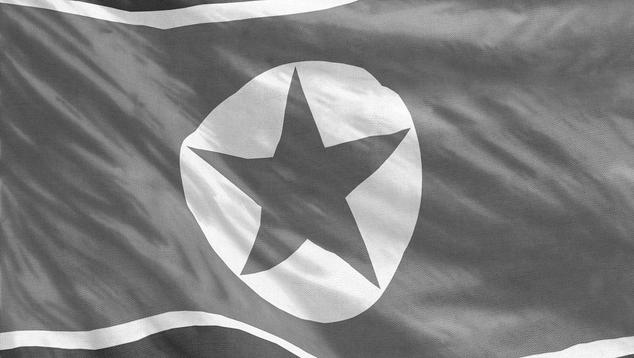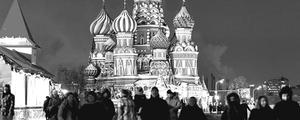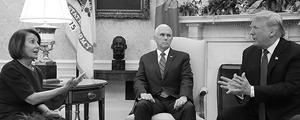Story Highlights
- 14% in U.S. say North Korea is the country's greatest enemy, down from 51%
- 86% of Americans view North Korea unfavorably
- 79% see North Korea's development of nuclear weapons as a critical threat
WASHINGTON, D.C. -- As President Donald Trump meets with North Korean leader Kim Jong Un, far fewer Americans today, 14%, see North Korea as the United States' greatest enemy than the 51% who did a year ago. Despite this decline, the vast majority of Americans still view North Korea unfavorably, and nearly eight in 10 see the country's development of nuclear weapons as a critical threat to U.S. security.
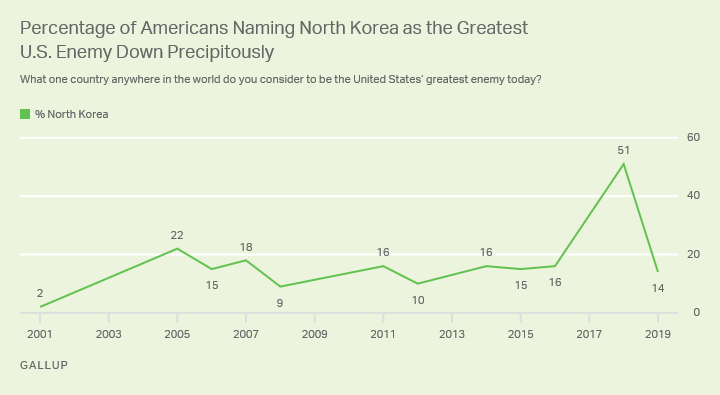
These data come from Gallup's annual World Affairs survey, conducted Feb. 1-10. Midway through the survey, on Feb. 5, Trump announced during his State of the Union address the date for his second summit with Kim. This year's survey marks the 12th time since 2001 that Gallup has asked Americans which country they perceive as the United States' greatest enemy -- and North Korea has been in the top five on that list in all but the first year.
The 51% of Americans who cited North Korea as the nation's greatest enemy in 2018 reflected the heightened state of tensions at that time following harsh rhetoric by Trump and Kim toward each other. That survey also came after a series of ballistic missile tests by North Korea, including one that demonstrated the ability to potentially strike the continental U.S.
Both sides subsequently cooled their rhetoric, and North Korea publicly committed to suspending nuclear and missile testing in April 2018. This was followed by a meeting between Kim and Trump in June. After these events, the percentage of Americans viewing North Korea as the United States' archrival fell precipitously, returning to pre-2018 levels.
Perceptions of North Korea as the United States' greatest enemy have fallen sharply among Americans of all political leanings. Now, the two major parties are about equally likely to identify North Korea as the nation's greatest enemy. A year ago, Republicans were more likely to do so -- and thus, mentions of North Korea as the top enemy have fallen more sharply among Republicans, from 58% last year to 12% today. Among independents, there has been a 36-percentage-point drop (to 14%), and among Democrats, a 28-point drop (to 17%).
The 51% of all Americans who cited North Korea made it the top choice for 2018. In 2019, however, both Russia and China have eclipsed North Korea as Americans' pick for the country's greatest enemy.
Americans Continue to View North Korea Unfavorably
Despite their marked shift away from naming North Korea as the country's greatest enemy, the vast majority of Americans continue to see North Korea in a negative light. A full 86% of Americans say they have a mostly or very unfavorable view of North Korea, compared with 12% who have a very or mostly favorable view of the country.
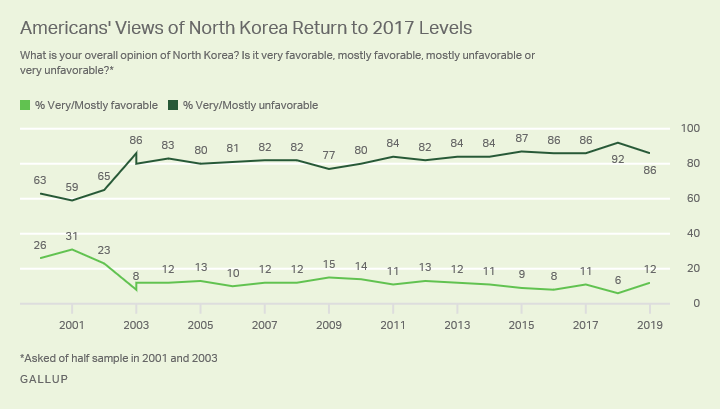
Large majorities of Americans have consistently viewed North Korea negatively since 2003. This followed President George W. Bush's labeling the country as part of the "axis of evil" and North Korea's announcement that it planned to withdraw from the Nuclear Non-Proliferation Treaty.
However, after ranging between 77% and 87% for more than a decade, the percentage of Americans with an unfavorable view of North Korea edged up to 92% last year amid escalated tensions. This year's decline to 86% represents a return to the trend's recent 10-point range.
Americans' negative views of North Korea are similar across party lines: 85% of Republicans, 86% of independents and 89% of Democrats view the country unfavorably.
Most Americans Still See Critical Threat in North Korean Nuclear Weapons
Americans' continued perception that North Korea's development of nuclear weapons poses a critical threat to U.S. security likely contributes to their negative views of North Korea. When asked what level of threat North Korea's development of nuclear weapons poses to the U.S., 79% of Americans say it poses a critical threat, 17% say it poses an important but not critical threat and 3% say it isn't an important threat at all. These percentages haven't changed substantially from the previous two times Gallup asked the question in 2018 and 2013.
| 2013 | 2018 | 2019 | |||||||||||||||||||||||||||||||||||||||||||||||||||||||||||||||||||||||||||||||||||||||||||||||||
|---|---|---|---|---|---|---|---|---|---|---|---|---|---|---|---|---|---|---|---|---|---|---|---|---|---|---|---|---|---|---|---|---|---|---|---|---|---|---|---|---|---|---|---|---|---|---|---|---|---|---|---|---|---|---|---|---|---|---|---|---|---|---|---|---|---|---|---|---|---|---|---|---|---|---|---|---|---|---|---|---|---|---|---|---|---|---|---|---|---|---|---|---|---|---|---|---|---|---|---|
| % | % | % | |||||||||||||||||||||||||||||||||||||||||||||||||||||||||||||||||||||||||||||||||||||||||||||||||
| Critical | 83 | 82 | 79 | ||||||||||||||||||||||||||||||||||||||||||||||||||||||||||||||||||||||||||||||||||||||||||||||||
| Important but not critical | 14 | 14 | 17 | ||||||||||||||||||||||||||||||||||||||||||||||||||||||||||||||||||||||||||||||||||||||||||||||||
| Not important at all | 3 | 3 | 3 | ||||||||||||||||||||||||||||||||||||||||||||||||||||||||||||||||||||||||||||||||||||||||||||||||
| Gallup | |||||||||||||||||||||||||||||||||||||||||||||||||||||||||||||||||||||||||||||||||||||||||||||||||||
Among both Democrats and Republicans, there has been little movement in views that North Korea's development of nuclear weapons poses a critical threat to U.S. security. Currently, 81% of Democrats and 86% of Republicans see it as a critical threat, compared with last year's 82% and 88%, respectively. There has been a decline among independents, with 74% now saying the issue is a critical security threat, down from 81% in 2018.
Bottom Line
Trump touted his last summit with Kim as a great success. That meeting and the subsequent softening of rhetoric between the two leaders has perhaps contributed to Americans being substantially less likely to view North Korea as the United States' greatest enemy. However, there has been only modest improvement in Americans' overall opinion of North Korea and in their view that North Korea's development of nuclear weapons poses a critical threat to vital U.S. interests.
Americans' perceptions may have been affected by a belief that the imminent threat of war between North Korea and the U.S. during the crisis had passed, but that the country remained a bad actor on the world stage. This may be due, at least partially, to continued questions concerning North Korea's commitment to denuclearization and widespread human rights violations by the country's government. All of these developments have contributed to Americans' perceptions of North Korea, including the threat posed by the country returning to pre-2018 levels.
View complete question responses and trends.
Learn more about how the Gallup Poll Social Series works.
